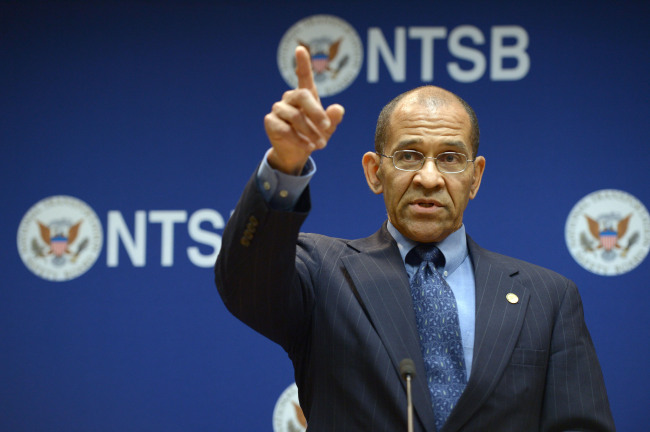Asiana, Boeing express mixed feelings about crash report
By Korea HeraldPublished : June 25, 2014 - 21:37
A U.S. safety agency’s probe report into the 2013 deadly landing of an Asiana Airline aircraft in San Francisco yielded mixed reactions from the South Korean air carrier and the manufacturer Boeing.
On Tuesday, the National Transportation Safety Board concluded that pilot error caused the crash as the Asiana crew over-relied on automated systems that they did not fully understand.
“As a result, they flew the aircraft too low and too slow, and collided with the seawall at the end of the runway,” Christopher Hart, the NTSB’s acting chairman, said at a board meeting in Washington.
On Tuesday, the National Transportation Safety Board concluded that pilot error caused the crash as the Asiana crew over-relied on automated systems that they did not fully understand.
“As a result, they flew the aircraft too low and too slow, and collided with the seawall at the end of the runway,” Christopher Hart, the NTSB’s acting chairman, said at a board meeting in Washington.

Two Chinese teens were killed and more than 180 other people were injured when the plane crash-landed at San Francisco International Airport on July 6, 2013,
But the agency added that the complexity of the Boeing 777’s auto throttle and auto-flight director ― two of the plane’s key systems for flight control ― contributed to the accident.
“Automation has unquestionably made aviation safer and more efficient. But the more complex automation becomes, the more challenging it is to ensure that the pilots adequately understand it,” Hart said.
Asiana agreed with the agency’s findings about the complexity of the auto throttle and autopilot programs as a factor in the crash, pledging to strengthen the company’s safety systems overall, including pilot training.
“We apologize again to the public. Despite all the complicated factors behind the accident, we accept the NTSB’s conclusion that the ultimate responsibility for controlling the situation was on the pilots,” the company said.
But Boeing immediately rejected the notion that the 777’s automated systems contributed to the accident, citing the aircraft’s safety record.
“The auto-flight system has been used successfully for over 200 million flight hours across several airplane models, and for more than 55 million safety landings,” the company said in a statement. “The evidence collected during this investigation demonstrates that all the airplane’s systems performed as designed.”
On Wednesday, Korea’s Transport Ministry said it was also considering requiring an additional probe to determine whether human error or violation of safety regulations contributed to the accident.
The final NTSB report is expected to be released next month.
By Lee Ji-yoon and news reports
(jylee@heraldcorp.com)
-
Articles by Korea Herald



















